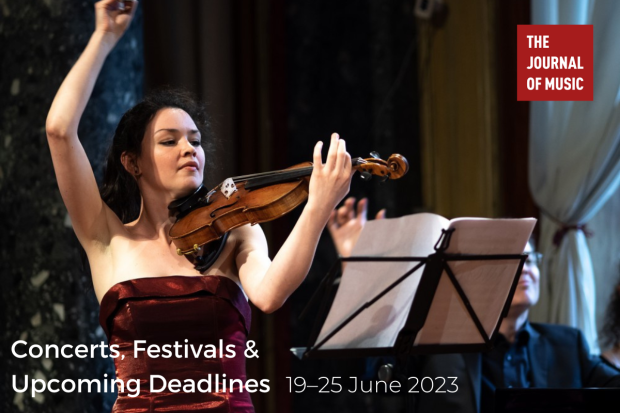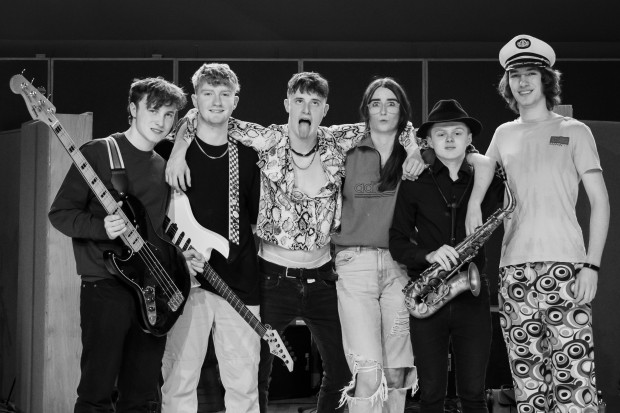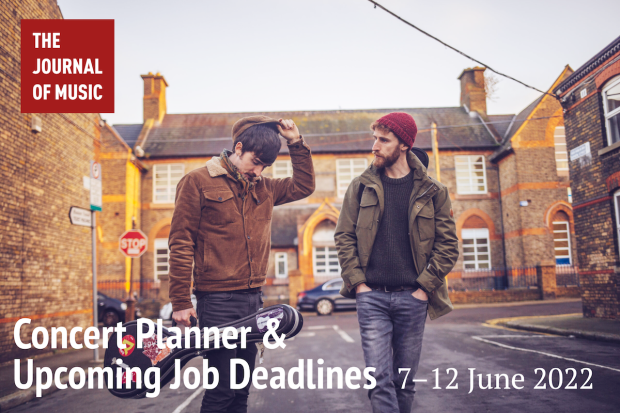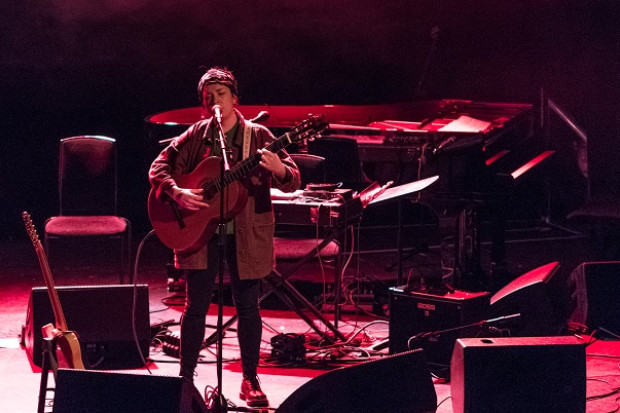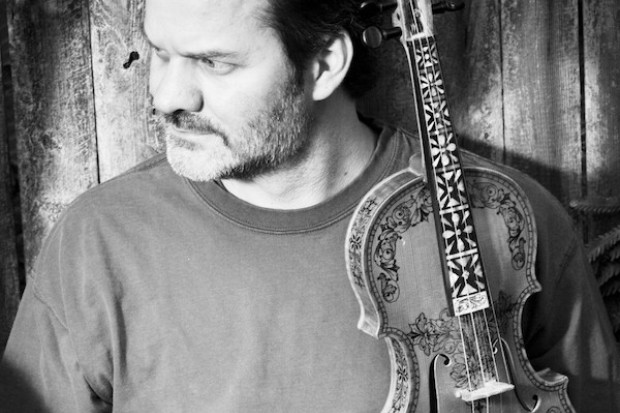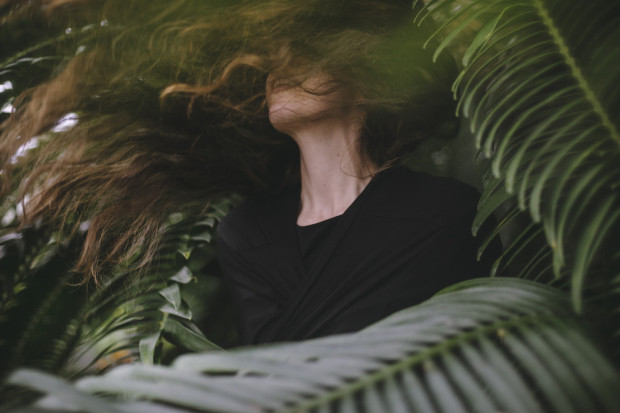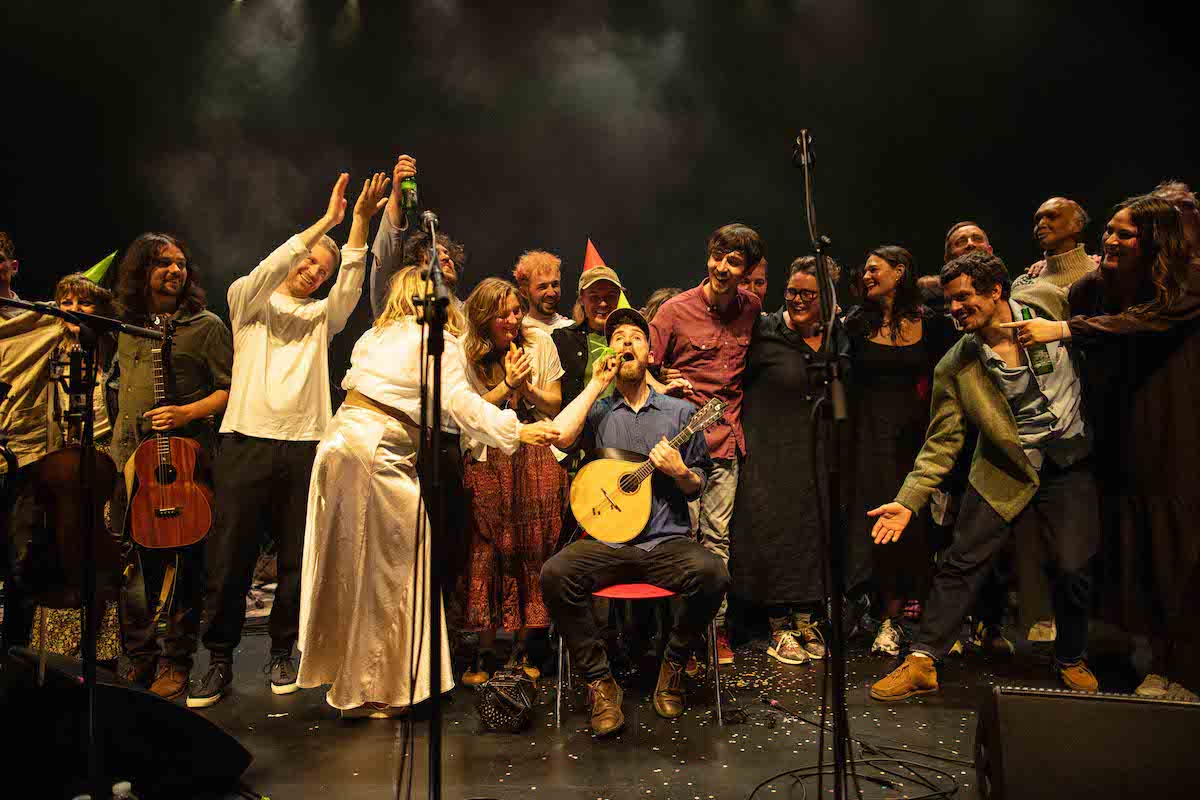
The festival finale at Sounds from a Safe Harbour with Ye Vagabonds and guests. (Photo: Bríd O'Donovan)
Cork on a Good Day
Sounds from a Safe Harbour has shown that it is capable of many things, but it seems it has become particularly adept at finding the right slogan. An utterance made from the stage by Bon Iver during his headlining performance at the second Sounds from a Safe Harbour in 2017 had become enshrined in the festival’s branding when the third edition came around in 2019 – ‘It’s a spiritual f–king thing’. You could debate the merits of it, but it does touch on something crucially indefinable.
On the Sunday of this year’s celebration of music, art and conversation, another phrase, or perhaps more accurately an idea, emerged. Something equally elusive but intuitively understood revealed itself during the afternoon performance of The Vernon Spring when branded cards bearing various photographic images of trees were dutifully handed out to each audience member, bearing the phrase: ‘If you feel like you’ve been here before, it’s because you have been here before.’
That very phrase was repeated that evening at Lighthouse Constellations, an event hosted by Ye Vagabonds; first it was projected above the stage at the beginning of the show, and then repeated later on through a recording voiced by festival co-curator Cillian Murphy and written by the festival’s writer-in-residence, Max Porter.
The phrase may not quite be in the league of T. S. Eliot’s ‘Little Gidding’, – ‘…to arrive where we started/And know the place for the first time’ – but it articulates a similar spirit. It could equally apply to the participating artists as much as to the audience. Many of the musicians have become familiar presences at the festival, and have returned due either to the persuasive abilities of festival founder Mary Hickson or the ineluctable possibility of something magical happening.
Earth, on a Good Day
Max Porter’s koan certainly made sense for The Vernon Spring’s Earth, on a Good Day. Under his musical alias, London songwriter and musician Sam Beste unexpectedly found himself revisiting his own compositions for that recent release. It all started when other musicians, with no prompting nor coordination, sent him their adaptations of Vernon Spring’s compositions. It’s easy to see why. Beste’s compositions are of such spectral and ethereal quality it’s as if they have been cleansed like a palimpsest, prepared for a new text to be imposed upon them.
Accompanied throughout his performance by gentle electronic ambience, Beste’s playing at the upright piano could be so quiet you could not just hear the clacking of the keys but the actual squeak of the hammers. He was joined throughout the performance by such friends of the festival as cellist Kate Ellis, a ubiquitous presence throughout the weekend, revered Icelandic composer Ólafur Arnalds, and dynamic multi-instrumentalist Shahzad Ismaily, as well as Hana Stretton and Ye Vagabonds for vocal performances. While ostensibly located in the ambient and modern composition arena, the Vernon Spring sound is imbued in soul, blues and gospel, and while the latter performers’ contribution was rapturously acclaimed, I found it a little too earthy and bucolic to snugly fit. The diaphanous space of St Luke’s, however, was a perfect space for this, and there’s a reason why it’s located on a hill – so that concert goers can float down into town after performances such as this.

Ólafur Arnalds, Niamh Regan, Eoin French and Ye Vagabonds performing at Sounds from a Safe Harbour (Photo: Bríd O’Donovan)
Part of a continuum
There is an inescapable feeling that Sunday audiences were being prepared for this state. One of the last events on the Saturday was a ‘Liminal soundbath’ hosted by Sigur Rós collaborator Alex Somers, where audiences were invited to bring mats to the expansive Marina Market space. Mats were also required on Sunday morning when the festival hosted a pop-up yoga session in Fitzgerald’s Park. If one attended those two events, then an afternoon of scent and music hosted by Icelandic artist-run perfumery Fischersund and record label compatriots INNI felt like it was part of a continuum. Entrants were provided with a spray of perfume on the wrist and once inside received an ambient bubblebath of soothing orchestral electronics. The Fischersund crew also filtered through the audience brandishing incense sticks. After an hour or so the duo from INNI were joined on stage by local musician Eoin French, aka Talos, on vocals and electronics and Icelandic composer Atli Örvarsson on piano. Given that one of Iceland’s most famous exports is Jónsi, French’s yearning falsetto felt quite in keeping.
While the major headline events at the Cork Opera House – Feist, Wilco and Ye Vagabonds – reached capacity, as might be expected, one of the hottest tickets was the unveiling of the fruits of a collaboration between Cormac Begley, Romain Bly, Kate Ellis and Caimin Gilmore. In fact, there was still a queue almost the length of St Luke’s as the opening notes were being struck within. And serious low register drones they were, on double bass, cello and French horn, when with a sudden flick of Ellis’s wrist the quartet launched into a rousing and flighty reel. Gilmore was creating some serious rumbles as he rubbed his bow across the strings of his upright bass, while from Bly’s horn fizzed dramatic notes like fireworks. ‘Anyone else sweating?’ asked Begley. Surely there was, and it had little to do with the blazing sun outside.
The project has its origins in Cork’s Quiet Lights festival, where Begley met Gilmore at a Lankum gig. The bringing together of these musicians from different but overlapping worlds has produced something that doesn’t just accommodate the four musicians but is simultaneously alive with their individual sounds while being able to go into unexpected territories, such as the number that sounded like a tightly coiled, looping dance track. Of course it wouldn’t be a gig featuring Begley if it didn’t have ‘O’Neill’s Cavalcade’, which saw Bly rousing the troops with a clarion call.

Kate Ellis, Cormac Begley, Romain Bly and Caimin Gilmore at St Luke’s (Photo: Bríd O’Donovan)
Wordsmiths
Elsewhere, Rónán Ó Snodaigh and Myles O’Reilly eased us with uplifting vibes and Wicklow’s Anna Mieke took advantage of her Wilco support slot and her tight ensemble of Matthew Jacobson on drums and percussion and Ryan Hargadon on keyboards and clarinet to showcase her Theatre album from 2022. Max Porter wasn’t the only wordsmith present. Enda Walsh shared a work in progress featuring electronic compositions from Anna Mullarkey. We would have to imagine where the choir would fit in, advised the playwright, while actor Aoife Duffin proved she can find the high notes in the libretto.
Other events saw Feist, Todd Dahlhoff, Shahzad Ismaily and local musician Elaine Howley accompany a reading of Porter’s Shy, and the beat poetry stylings of British author Megan Barker’s KIT were accompanied by a band that included Arcade Fire’s Richard Reed Parry on double bass and Canadian singer Ariel Engle. One of the hippest and forward-looking music festivals of recent decades, the UK’s All Tomorrow’s Parties pioneered and became synonymous with the band-does-classic-album concert. Perhaps there is a blueprint here for Sounds from a Safe Harbour to venture further down the route of creating live musical accompaniment to literary readings?
Navigation in the dark
The festival was brought to a close in celebratory style as Ye Vagabonds presented an event called Lighthouse Constellations. Paddy Keenan opened proceedings with a piece on uilleann pipes. The event’s concept, explained Diarmuid Mac Gloinn, relates to navigation in the dark and how a lighthouse is a guide to deeper channels. In mind of this, a very open prompt was offered to a constellation of star musicians attending the festival. It suggested that the thing that lights their lives could be anything from a coffee to a photo of their mother. It was a night of interesting and apt musical responses. Kate Ellis, Romain Bly, Ismaily on drums and Myles O’Reilly provided a lot of the backing. A choir featuring, among others, members of The Staves, Niamh Regan, Eoin French and UK folk duo Memorial, all under the guidance of Cork vocal educator Laoise Leahy, added a sense of continuity to the revolving cast.
Appropriately, Ye Vagabonds offered ‘An Island’ and ‘Go Away and Come Back Hither’. Both Regan and Anaïs Mitchell received piano accompaniment by Olafur Arnalds. ‘It’s lovely to be here playing with this band,’ beamed Mitchell, ‘some of whom I’ve just met.’ Dermot Kennedy took to the piano to sing ‘Rome’ and Rónán Ó Snodaigh’s ‘Calling All Angels’ was a big-hearted moment of hugs and bonhomie
For the occasion, two-thirds of UK indie-folk sisters The Staves presented a brand new song in public for the very first time. Utterly gorgeous, it was enough to light any weary traveller’s path home.
Visit https://soundsfromasafeharbour.com
Subscribe to our newsletter.

Rónan Ó Snodaigh at Cork Opera House (Photo: Bríd O’Donovan)
Published on 14 September 2023
Don O'Mahony is a freelance arts journalist based in Cork.










